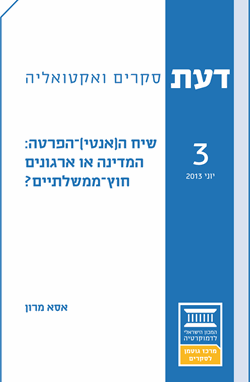The Controversy over Privatization of Social Services in Israel
Daat 3, June 2013
- Written By: Asa Maron
- Publication Date:
- Cover Type: Online Booklet
- Number Of Pages: 16 Pages
- Center: Viterbi Family Center for Public Opinion and Policy Research
An exploration of Israeli public opinion on the State's responsibility for the social welfare of its citizens and the provision of social services by non-governmental organizations.
The privatization debate in Israeli public life tends to link two processes that are taking place as part of the recent changes in the welfare state. The first is the State’s retreat from its responsibility to enable citizens to realize their social rights, while the second is the increasing involvement of nongovernmental organizations in the provision of social services in Israel.
Even though recent decades have provided good reasons for linking these two processes, it is appropriate to distinguish between them. This distinction is particularly important because the Israeli public, while supporting greater State involvement in social and economic matters and seeing the State as bearing the bulk of responsibility for the welfare of its citizens, also recognizes the potential of NGOs to provide innovative and effective services tailored to the needs of citizens, within the framework of the welfare state.
This booklet has a twofold goal: to distinguish between these two processes and to present the preferences of the Israeli public with regard to the provision of social services by nongovernmental agencies.
The data show that the Israeli public is aware of the quality and expertise of NGOs as suppliers of social services. The preferences of three groups of respondents in particular bolster this assessment: respondents who would rather receive services from a state agency, respondents who want the state to continue to be involved in social and economic affairs, and respondents who say that they have no faith in NGOs. It is therefore possible to conclude that the Israeli public would support the inclusion of NGOs as providers of social services as long as the welfare state assumes overall responsibility for these services, guarantees them, and funds them appropriately.
Asa Maron is a doctoral student in the Sociology Department at Ben Gurion University of the Negev. He specializes in the sociology of the welfare state and sociology of citizenship.

